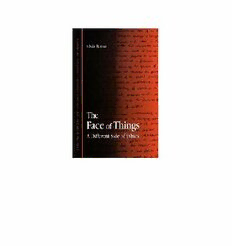
The Face of Things: A Different Side of Ethics PDF
Preview The Face of Things: A Different Side of Ethics
Page i The Face of Things Page ii SUNY series in Contemporary Continental Philosophy Dennis J. Schmidt, Editor Page iii The Face of Things A Different Side of Ethics Silvia Benso Page iv Published by State University of New York Press, Albany © 2000 State University of New York All rights reserved Printed in the United States of America No part of this book may be used or reproduced in any manner whatsoever without written permission. No part of this book may be stored in a retrieval system or transmitted in any form or by any means including electronic, electrostatic, magnetic tape, mechanical, photocopying, recording, or otherwise without the prior permission in writing of the publisher. For information, address State University of New York Press, State University Plaza, Albany, N.Y., 12246 Production by Diane Ganeles Marketing by Fran Keneston Library of Congress CataloginginPublication Data Benso, Silva. The face of things : a different side of ethics / Silva Benso. p. cm.—(SUNY series in contemporary continental philosophy) Includes bibliographical references and index. ISBN 0791445739 (alk. paper)—ISBN 0791445747 (pbk. : alk. paper) 1. Ethics, Modern—20th century. 2. Lâvinas, Emmanuel—Contributions in ethics. 3. Heidegger, Martin, 1889–1976—Contributions in ethics. I. Title. II. Series. BJ319 .B467 2000 170dc21 99043441 10 9 8 7 6 5 4 3 2 1 Page v To Brian, Ulysses, and Clio Faithful companions of all my joys and sorrows Page vii CONTENTS Acknowledgments xi Abbreviations xv Preface xix Part I. Levinas: Love without Things 1. Out of Love: The Break with Parmenides 3 2. In Love: Ethics as the Meeting Place 17 3. My Love, Who Are You? The Face of the Beloved Other 29 4. Without Love: The Disappearance of Things 45 Part II. Heidegger: Things without Love 5. The Question of Things 59 6. Phenomenologically, Things 67 7. Instrumental Modes of Disclosure 75 8. Artistic Modes of Disclosure 93 9. Ethical Disclosure? The Faciality of Things 111 Part III. The Ethics of Things: Tender Love, Festive Things 10. Prelude: Toward an Ethics of Things 127 11. Things' Obsessive Appeal 143 12. Touch, Attention, Tenderness 159 Page viii 13. Saddened Tenderness: Violence and Resistance 173 14. Festive Celebrations 181 Notes 197 Bibliography 231 Index 253 Page ix And therefore as a stranger give it welcome. There are more things in heaven and earth, Horatio, Than are dreamt of in your philosophy. Shakespeare, Hamlet I.i. 165–7 Page xi ACKNOWLEDGMENTS Over the years and across various landscapes, many faces (and not all of them human) have left marks of their passage in the folds of the thing which is now this book. Some of these faces remain unnamed—pure, anonymous presences that have enriched my work with the warmth of an essential moment, the gift of a shared thought, or the joy of a sudden inspiration. Some other faces have become unnameable—changes in the circumstances of life now forbid naming what once was close, dear, and memorable. Still, other faces should be named, and I gladly do so, in thankful gratitude for their precious presence by my side, in friendship and love, even when at a distance. My intellectual gratitude goes to my former teachers in the Italian academia—Giuliana Giachino, Ugo Perone, Maurizio Pagano, Claudio Ciancio, and Gianni Vattimo—who first aroused my love for philosophy, my passion for ethical questions, and my interest in Levinas and Heidegger. The same intellectual gratitude goes to my more recent teachers in the graduate program in philosophy at the Pennsylvania State University—Veronique Foti, A1 Lingis, Carl Vaught, Dan Conway, and Joe Flay—who nourished my initial love of philosophy, gave it rigor and discipline, refined my knowledge, and supervised in various ways the writing of the original core of this work in the form of a dissertation. To this list I gratefully add the name of Adriaan Peperzak. I would also like to thank John Caputo, who read an early version of this project and, despite its roughness and approximation, gave me advice and encouragement to proceed. Many thanks go to my colleagues at Siena College—Ray Boisvert, John Burkey, Fr. Julian Davies, Dick Gaffney, Jenny McErlean, Paul Santilli, Fr. John VanHook—who supported my project, accommodated a demanding teaching schedule to my research needs, and
